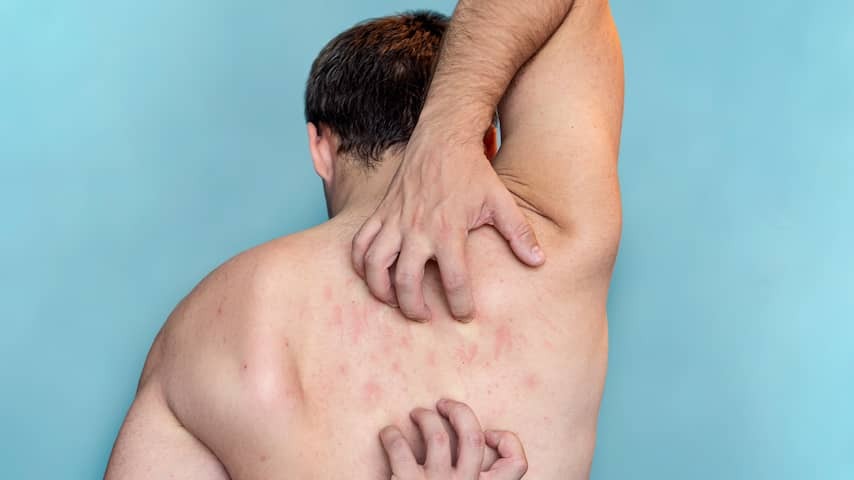
When the insect season is in full swing, mosquitoes emerge with the changing weather. Your skin doesn’t always react the same way to a bite or sting: sometimes you get a bump, sometimes you have a limb that stays swollen for weeks. When is it serious?
When an insect bites or stings you, the barrier of your skin is pierced by the stinger or the mouth of the creature. They leave saliva or venom in your body. All alarm bells in your body go off: that foreign substance, the saliva or venom of an insect, must be rendered harmless immediately.
“Your body can then react violently,” says allergist Hanneke Oude Elberink, who specializes in insect allergies. “Your body will produce antibodies to neutralize those foreign substances and break down the venom. Everyone reacts to that. Sometimes with a bump, sometimes with local severe swelling.”
Venom sac of stinging insect is larger
The allergist says that there are two types of insects: stinging and biting. The stinging insects have a venom sac and a stinger. The amount of venom they leave in your body is greater than the amount of saliva from a biting insect. Your body then reacts much more violently to stings. Common stinging insects in the Netherlands are wasps, bumblebees, horseflies, hornets, stable flies and bees.
Biting insects are mosquitoes, ticks, horseflies – the latter group carries many different names. If you are lying scratching in your tent, the mosquito is most likely the culprit. You don’t have to run to the doctor with bumps from a sting or bite, says Oude Elberink, in fact: you rarely really have to worry.
A cold compress relieves the heat and pain
“At the beginning of the summer, we see that the body reacts more violently to insect bites,” she says. “It seems as if we have to get used to it again for a while. By the end of the summer, we have been bitten more often, and the body reacts less strongly.” Why one person has a small bump, and another person has severe swelling that lasts for a week: that is not really clear yet.
It is annoying to walk around with a thick, swollen arm for a week or two, but once the severe swelling is there, a doctor can do little more. “You can possibly apply corticosteroids to the spot, i.e. hormone ointment,” says Oude Elberink. “But this ointment works especially well if you apply it to the skin immediately after a sting or bite. That calms the inflammatory reaction in the skin. If you only apply it after a day, the inflammation is still difficult to suppress”
Cold compresses help to relieve the heat and pain, but not to reduce the swelling, says the allergist. “A doctor can prescribe anti-inflammatory ointment or tablets, such as prednisolone. You can use them immediately after a next sting to prevent a swollen limb.”
How to keep insects at bay
You can never completely escape stinging and biting creatures, but you can keep them at a distance. Remove stagnant water around your house and garden, empty paddling pools, clear gutters, turn flower pots upside down. Place physical barriers in your house, such as mosquito nets and screens.
Don’t drink directly from a can, there may be an insect in it. Do not move tree trunks, there may be a wasp nest underneath. Avoid brightly colored clothing and strongly scented cosmetics. Never hit a bee or wasp, and use insect repellent spray with a high percentage of DEET.
An anaphylactic shock from a wasp or bee
In rare cases, things go completely wrong. People can react to a wasp or bee sting with an anaphylactic reaction. Such a reaction can consist of itching and swelling all over the body, difficulty breathing and dizziness, severe headache, vomiting, diarrhea, severe drop in blood pressure, heart rhythm disorders, loss of consciousness, shock or cardiac arrest.
“In the event of such a reaction, go to the emergency room immediately, and then to an allergist for treatment,” says Oude Elberink. Once you have had such a reaction, a doctor will prescribe an emergency pen, or adrenaline auto-injector, so that you can inject yourself immediately in the event of an anaphylactic reaction.
“We can also treat people with this allergy with immunotherapy. The patient is then given small amounts of insect venom, so that they become less sensitive to it. Such a course lasts a few years and is a treatment with very high therapeutic adherence,” says the allergist. “Such a violent reaction feels like you have stared death in the face.”
Science has no answer yet to the question of who can develop such an allergy. Patients suffering from mastocytosis are at great risk. That is a rare disease that affects one in 100,000 people.
No worries about dengue or malaria in the Netherlands
A mosquito bite is harmless, but the saliva can be infected because the mosquito has bitten an infected person. In this way, malaria, dengue virus or chikungunya are spread in tropical areas. In the Netherlands, there are almost never infected mosquitoes that make you sick. In the summer of 2020, an infection with the West Nile virus was first detected in someone who contracted it in the Netherlands.
Lyme disease can be contracted through the bite of an infected tick. Most people do not get sick from a tick bite. The chance of getting Lyme disease after a tick bite is estimated at 2 percent, or two out of every hundred tick bites, according to the RIVM.